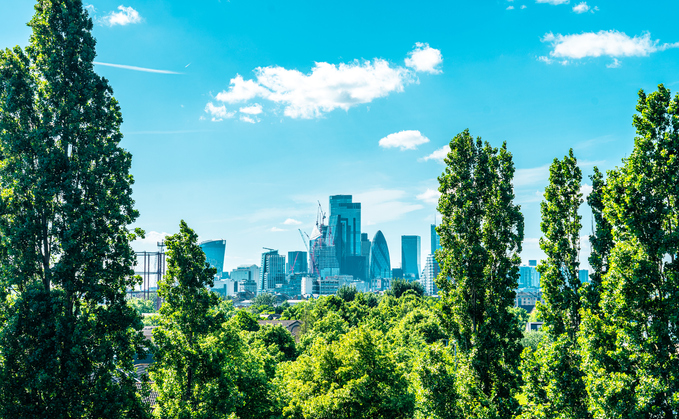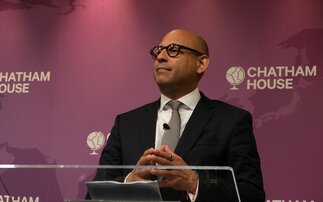
There are many brilliant women working to advance the green economy - the inaugural Women in Green Business Awards aims to provide the celebration they deserve
Another year, another International Women's Day, and with it the obligatory flurry of reports counting the ways rising temperatures, extreme weather, energy insecurity, and food and resource scarcity are disproportionately hurting women and girls. For the BusinessGreen newsroom, it also brings a wave of invites to interview women in green business who can speak to the barriers they have surmounted to advance their careers, and the example they are hoping to set for women engaged in the net zero transition.
There is, of course, a link between these two trends. Green businesses may have a progressive reputation, but just like in the wider economy, women remain underrepresented across many green industries. Those women who are working in net zero sectors continue to face major barriers to their advancement, as they navigate human resource systems, ways of working, and corporate cultures that are too often designed for men. This is not just a great injustice for half the population, it is also bad news for the UK's net zero transition, given the value a diverse workforce and different perspectives can bring for businesses. It is not a reach to say that failing to tackle gender inequality in the UK's green economy will handicap its ability to bring down emissions and mitigate the huge harm climate change inflicts on women and girls globally.
While data tracking the the overall gender breakdown of women in the UK's green economy is hard to come by - the jury is still out on how to define a 'green' job - there are no shortage of industry-specific snapshots that together provide a worrying picture of the current state of play. Take the heat pump installer workforce, for example. Yesterday on BusinessGreen, Leah Robson, the founder of renewables installer firm Your Energy Your Way, pointed to the "huge potential" women have in advancing the heat pump sector, as she highlighted a government study from last year which indicates less than three per cent of the total heat pump workforce is female.
It is a maddening statistic when you consider the sheer number of heat pump installers required to re-engineer the UK's millions of homes away from fossil gas and towards cleaner forms of heating. The UK's Heat Pump Association said this week that 33,700 installers will be needed to meet the government's (relatively modest) heat pump targets. But just 11,000 heat pump installers have been trained over the last two years. It would surely be easier to recruit the thousands more installers who are needed, if more than just three per cent were women.
This is just a snapshot of the gender mix in one corner of the net zero transition. You don't have to look far to see similar issues replicated in a number of other sectors set to be linchpins of a prosperous low-carbon economy. STEM-based sectors where women are historically under-represented - energy, engineering, infrastructure, construction, automotive - are right at the heart of the net zero transition.
And these trends are compounded by the way the industry that underpins all green business activity - the finance sector - is still dominated by men. As Carbon13's Stephanie Alys writes on BusinessGreen today, the majority of investment decisions are made by men, with more funds in the UK run by 'Davids' than women. Fewer women making calls on where money for tackling and adapting to climate change is invested - taken alongside the UK government's shameful failure to properly apply a gender lens to climate finance programming - stacks the chips against a transition that works for women, both in the economically flat-lining UK and in the climate-exposed Global South.
But despite these bleak macro trends, there is a growing understanding of the critical importance of not dissuading half the UK's workforce from playing a role in driving the great industrial transition of our time. The last few years have seen the launch of a number of schemes designed to increase diversity in the UK's energy, engineering, and manufacturing workforces, with the looming green skills crunch prompting businesses to double down on diversity and inclusion initiatives and diversity targets. It is hugely encouraging that so many of the industry, investor, and corporate sustainability groups agitating most loudly for an ambitious net zero transition in the UK are fronted by women.
For its part, the Office for National Statistics is even considering breaking down its annual count of UK renewables jobs by gender, with a spokesperson telling BusinessGreen it was "aware of the interest" and mulling "further disaggregation" of its low-carbon economy data. The pan-economy measurement exercise would be a good starting point for holding central government accountable for ensuring its green industrial policy is not exacerbating existing gender inequalities in the UK workforce.
Last week, Tamsin Lishman, the CEO of ground source heat pump company Kensa, told me she was encouraged by the change she had witnessed over her career in the energy industry. "I don't want women coming up to be limited by some of the experiences that I went through," she said. "When I started working you didn't try and show you were a woman." She contended the energy sector today owes its decarbonisation success in part to its embrace of different styles of leadership. "In the energy transition, the older, more typically male styles of leadership aren't as successful [compared to] the more female style of collaboration, empathy, the willingness to take bold moves," she said. "There has been a shift. 'I'm going to tell you what to do' doesn't work when the world is changing fast."
All of this is why BusinessGreen is this morning launching a brand new awards focused on celebrating the contribution of women to the UK's green economy, the Women in Green Business Awards. The awards are the first to celebrate the achievements of women across the UK's green economy as a whole, with gongs up for grabs for business leaders, apprentices, financiers, technologists, marketeers, and entrepreneurs. While we are aware there are many brilliant gender diversity and inclusion initiatives within the sectors BusinessGreen covers, we felt it was important to host an event celebrating the achievements of women in the green economy as the whole, at what is a critical moment for a net zero transition facing significant political and economic headwinds.
The awards are in line with our ethos at BusinessGreen, which has long been to provide a solid dose of optimism amid the bleak headlines of breached temperature limits, climate policy u-turns, and economic challenges. In this case, we want to showcase the huge positive impact women are having across a range of green sectors in the UK, ranging from clean energy and carbon markets to STEM fields and the built environment. Women's participation in these sectors may not be anywhere near where it should be, but there are people and companies bucking the trend, blazing a trail for others to follow.
It is worth pointing out these awards will raise awarness around just one inequity within the UK's environmental and green business sectors. Earlier this year, the Race Report campaign raised an alarm over the chronic lack of racial and ethnic diversity in the environmental sector, noting that just six per cent of employees from more than 142 organisations identified as people of colour and other racially or ethnically minoritised groups. There is no doubt that more needs to be done to push for all types of diversity across the sector, starting with greater tracking and transparency, as well as concerted efforts to enhance inclusion and ensure equal opportunities.
The hope is the inaugural Women in Green Business Awards can play a small part in this crucial process, by showcasing the many inspiring women working in the green economy and providing them with an opportunity to come together to celebrate their many achievements. The awards will take place at a gala dinner this October in central London and nominations are open now. On this International Women's Day we would love to hear from you about the great work women are doing to advance the green economy - and why it deserves celebrating.
Full details on the criteria for each award, how to enter, and the awards ceremony are available on the Women in Green Business Awards website.
For any questions about the awards please email [email protected].








